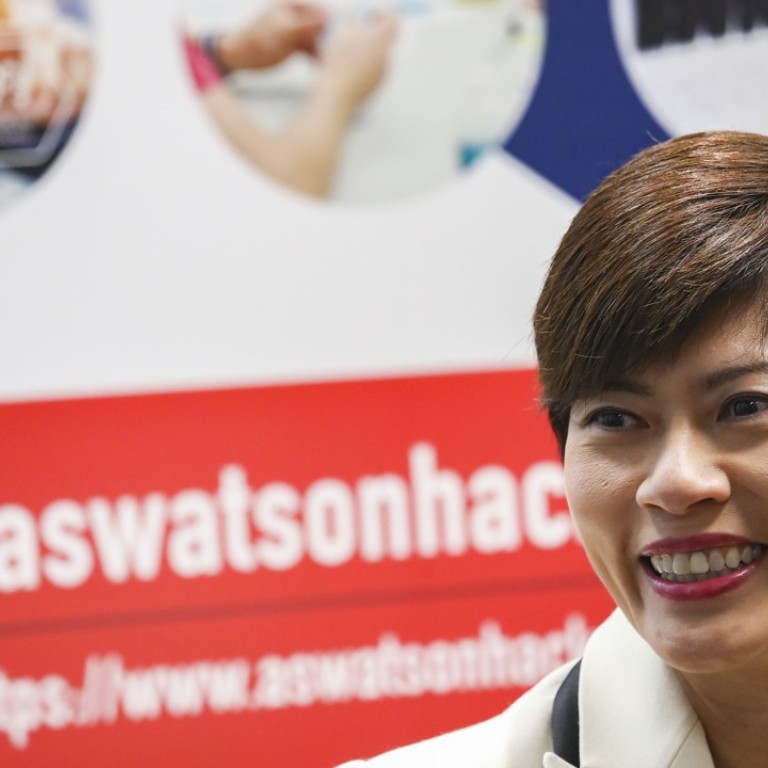
AS Watson hosts ‘hackathon’ challenge, in nod to importance of big data in retail management
Talent pool for data scientists in Hong Kong is ‘insufficient’, says chief operating officer of AS Watson
A S Watson Group, the retail unit of Li Ka-shing’s flagship conglomerate CK Hutchison, hosted over the weekend what it called the “first ever retail-themed big data hackathon in Hong Kong” to help it harness the power of data.
The retail giant hopes the event would help it scout for suitable candidates to become its staff or third-party data analytics consultants.
It plans to more than double its headcount of data scientists headcount, but recruiting such talent in Hong Kong is challenging, according to a top-level manager.
“The pool of data analytics talent in Hong Kong is insufficient, there are computer engineers but most of them work for the telecommunications, banking and airlines sectors,” Malina Ngai Man-lin, chief operating officer of Watson said on Sunday.
‘There is a notion that retailing is a more traditional industry that is not as exciting for data scientists to join.”
During the competition, Watson gave real operating data from its Hong Kong operations to 110 contenders, selected from over 200 applicants, who formed 16 competing groups.
They were asked to either identify consumer behaviour trends and devise a plan to capture market opportunities, improve shop product assortment planning or come up with better pricing and promotion strategies.
The teams comprised external local and overseas data scientists, programmers, smart devices’ user interface designers and retail experts, as well as Watson staff.
They were to be given a 35-hour deadline to identify a business problem, submit a prototype business case, and deliver a four-minute presentation to Watson management.
“We hope the event will help draw analytics talent to the retail sector, motivate our own data analytics staff to become quicker in new business strategy formulation, and attract some talent to work for us either as staff or partners,” Ngai said.
With over 14,000 stores in 24 markets, mainly in Asia and Europe, Watson recorded revenue of HK$151.5 billion (US$19.38 billion) in 2016.
In addition to health and beauty shops, Watson operates supermarkets, food and wine, and electronics retail chains.
Watson says it records four billion store visits a year, selling 30 million items per day worldwide, and has collected 4,300 terabytes of consumer data in three years.
The company has some 100 data scientists staff, mostly based in the UK an throughout Greater China.
“We plan to at least double the number this year,” Ngai said, adding that Watson wants to tap computing power to help it become faster at identifying business problems – such as a looming inventory shortage and logistics challenge, or changes in consumer demands.
“I also want technology to help our staff reduce their work time spent on transactions processing and other administrative tasks, and spend more time interacting with customers,” she said.
Watson has budgeted US$160 million on new technology, big data analytics and e-commerce tools, warehouse and logistics and related staff training for the three years to 2019.
Its decade-old loyalty programme has helped the company collect customer data and develop targeted marketing programmes.
The company, which celebrated its 175th anniversary last year, plans to open around 1,300 stores this year, similar to the number of new locations achieved in the past two years.
In mainland China, Watson operates 3,200 stores, with 483 added in 2017.
Asked if Watson would open staffless stores, Ngai said the company has trialled automation technology in a laboratory in the mainland, but said ts stores were unlikely go completely staffless in the near future.
“Human interaction is very important, we still need people to answer customer queries and stock the shelves,” she said.
The adoption rate of self checkout machines in Hong Kong varies between 10 and 30 per cent across different locations, with the highest rates seen in the central business districts, she added.
In 2014, Singapore’s state-owned Temasek Holdings bought an almost 25 per cent stake in Watson for HK$44 billion.

